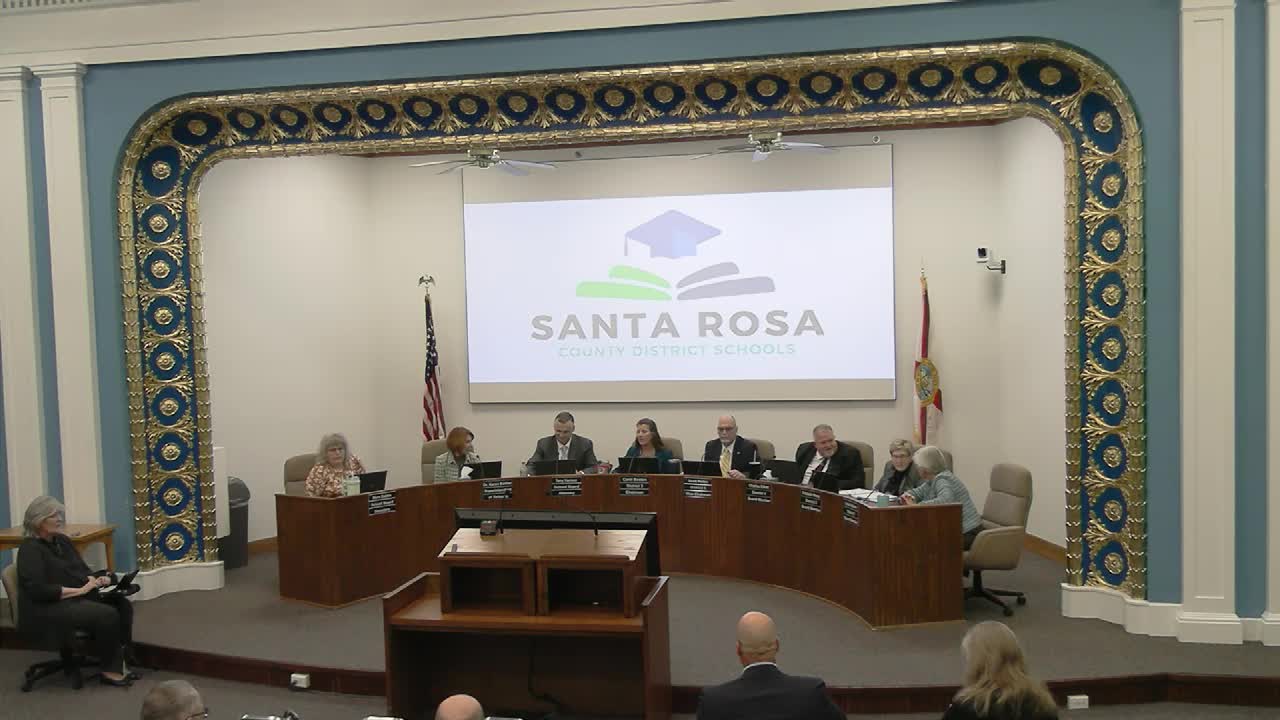Santa Rosa school board denies union appeal over counting administrative years toward teacher pay, 4-1
Get AI-powered insights, summaries, and transcripts
Subscribe
Summary
The Santa Rosa County School Board voted 4-1 on Jan. 16 to deny a Step 3 grievance filed by the Santa Rosa Professional Educators arguing that administrative years should count as "qualified years of service" for teacher salary placement.
The Santa Rosa County School Board voted 4-1 on Jan. 16 to deny a Step 3 grievance filed by the Santa Rosa Professional Educators (SRPE) that sought to require the district to count years served in administrative positions as “qualified years of service” for teacher salary placement.
The union argued that the district’s practice of crediting some former administrators’ administrative years toward teacher pay violates the master collective bargaining agreement’s definition of qualified years — which, the union said, is limited to full‑time teaching experience. The superintendent’s representatives told the board the district has followed a longstanding practice and a Human Resources policy and that granting the remedy would risk undoing settled individual teacher contracts and expose the district to legal liability.
SRPE presenters, including union president and chief negotiator David Godwin and SRPE representative Ms. Shavers, told the board the district’s August 27, 2024 salary report added a new column titled “admin years for teacher salary placement” and that column appeared only in 2024 salary reports. Godwin said the practice had been applied inconsistently: some former administrators received credit and higher pay while other returning administrators did not. He pointed to examples in the submitted salary reports and to an email dated Jan. 4, 2023 from Human Resources staffer Don Bagley that, in Godwin’s view, shows HR previously took the position that administrative years should not be applied to teacher placement.
Godwin summarized SRPE’s requested relief as: (1) apply only the contract’s definition of qualified years going forward, (2) revise years-of-service and salaries for currently affected instructional personnel, and (3) revise district salary reports to reflect years of service consistent with the master contract. Godwin told the board the union had not been aware of the new “admin years” column without making a public-records request and that the union therefore lacked notice of the practice. He said SRPE’s initial estimate of overpayment to affected employees was $123,062 for 11 employees, later adjusted to approximately $154,000 for 14 employees and, with benefits, about $189,000.
On behalf of the superintendent, Leonard Dietzen argued the grievance should be denied. Dietzen said the district has used a practice of crediting administrative years for personnel who return to instructional positions and pointed to a Human Resources Procedure Manual (HRPM) provision the board adopted that permits awarding administrative experience for salary purposes to an instructional position. He called the union’s requested remedy “retroactive” and warned it could require reducing pay for teachers who were hired or retained on the basis of the higher placement. Dietzen also urged the board to accept the superintendent’s step-2 response, saying the grievance lacks standing or is untimely and that past practice or waiver issues applied. He cautioned the board about potential litigation exposure under Florida law, citing unpaid‑wage statute Fla. Stat. 448.08 and other legal risks of altering settled individual contracts.
Board members asked questions and aired differing views in public discussion. Some members expressed sympathy for the affected teachers and concern about taking pay away from employees who had been told administrative experience would be recognized; one board member said, “I cannot justify in my mind taking away a penny, not a penny, from any of our employees.” Others emphasized contractual and procedural issues raised by the superintendent’s team.
After public discussion, a board member moved to deny the grievance and uphold the superintendent’s step-2 determination; the motion was seconded. The board voted 4–1 to deny the appeal. The board chair instructed the board attorney to prepare a written order reflecting the decision and said the written decision would be provided within five business days.
The dispute centers on interpretations of the district’s collective bargaining agreement and how Human Resources has recorded years of service on internal salary reports. Both sides told the board that contract language and prior communications shaped their positions: SRPE pointed to contract provisions that define “qualified years of service” as teacher/instructional experience, while the superintendent’s representatives cited HR practice and an HRPM provision adopted by the board that allows awarding administrative experience for salary purposes when staff return to instructional roles.
The board’s oral decision concludes this Step 3 appeal in favor of the superintendent’s step-2 report. The board’s written decision will state the outcome and the rationale and will be incorporated into the official record.
